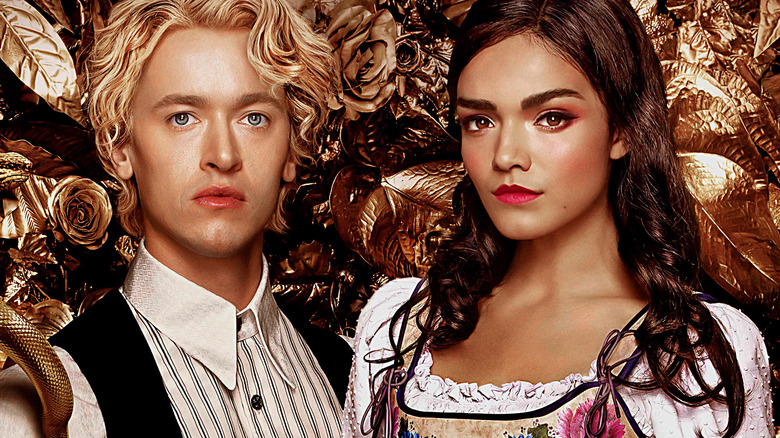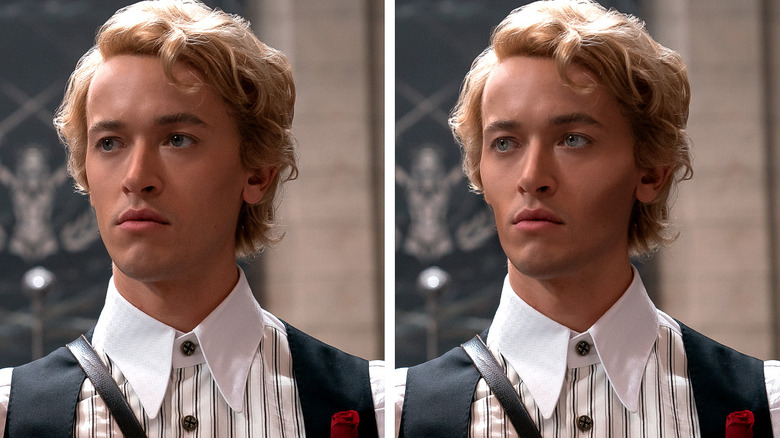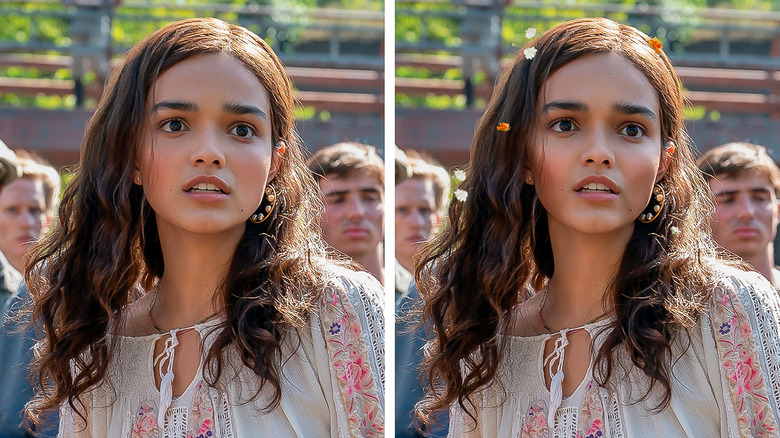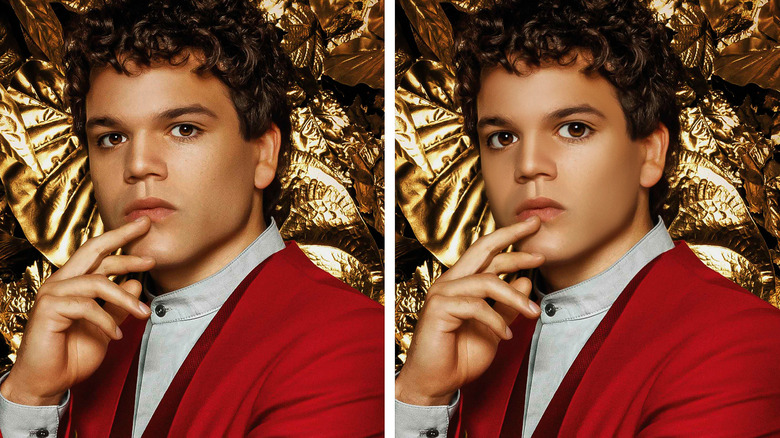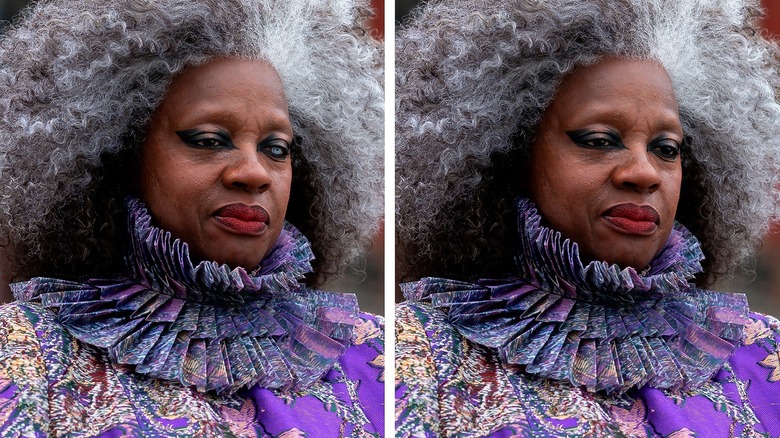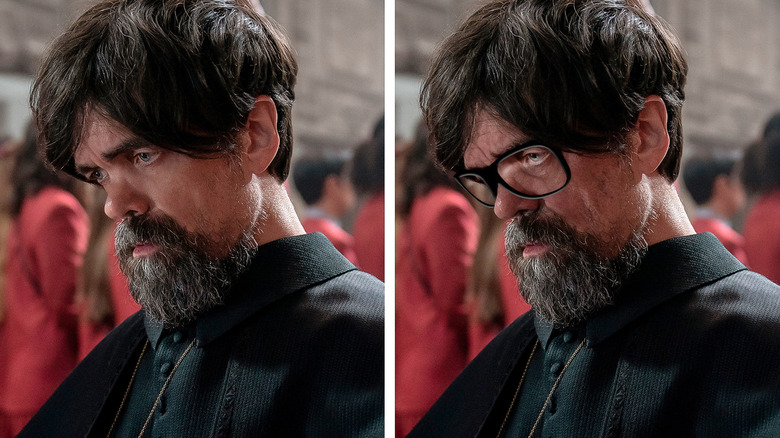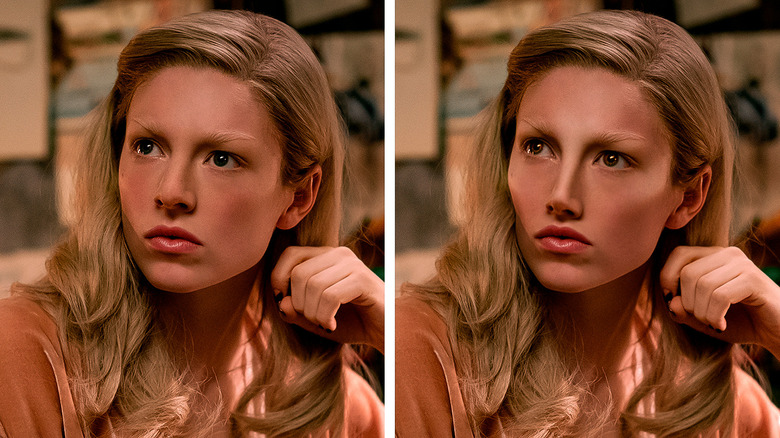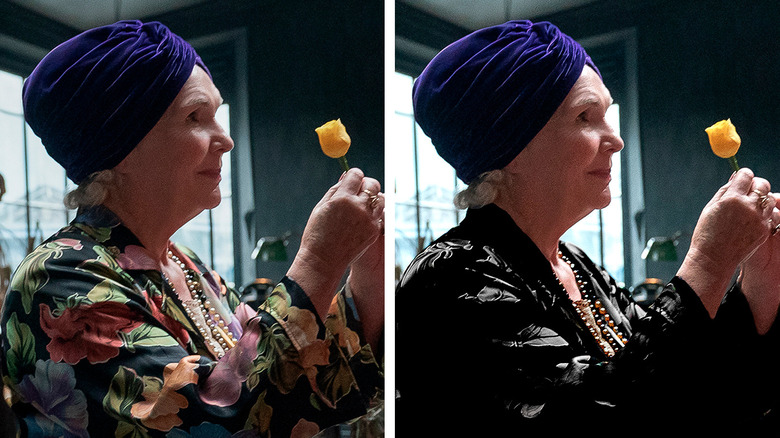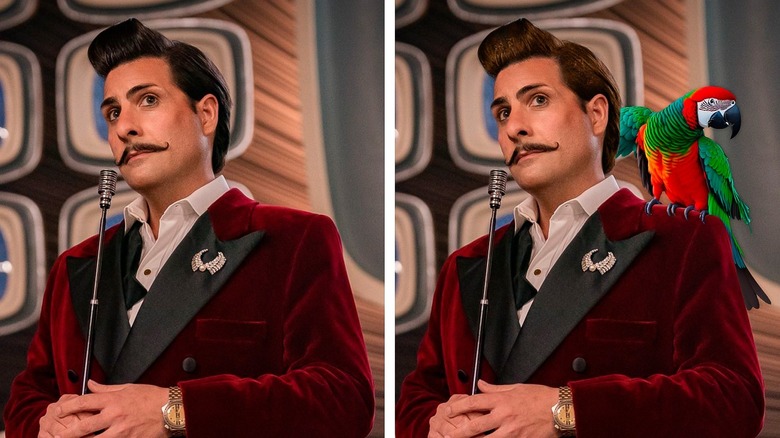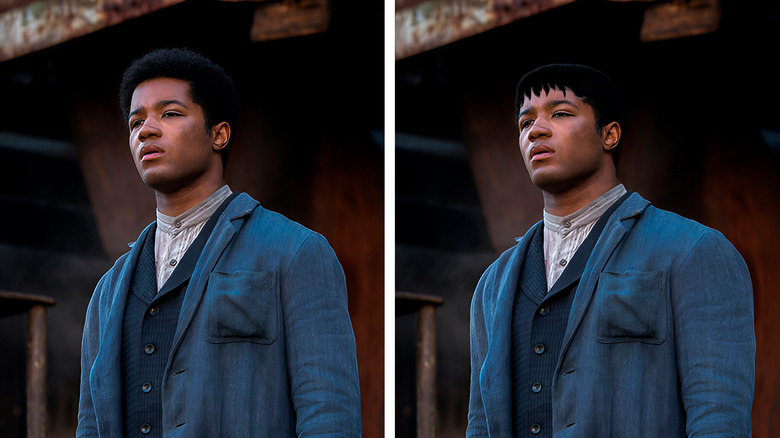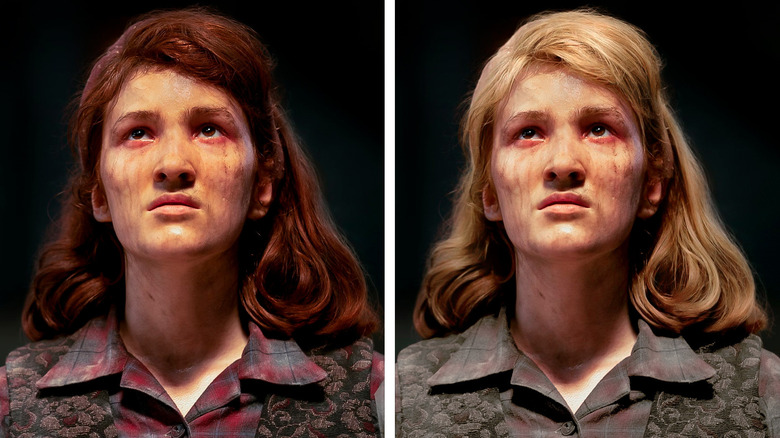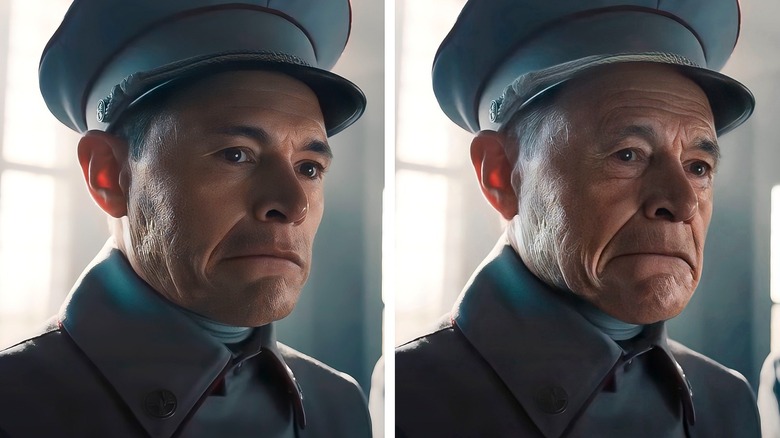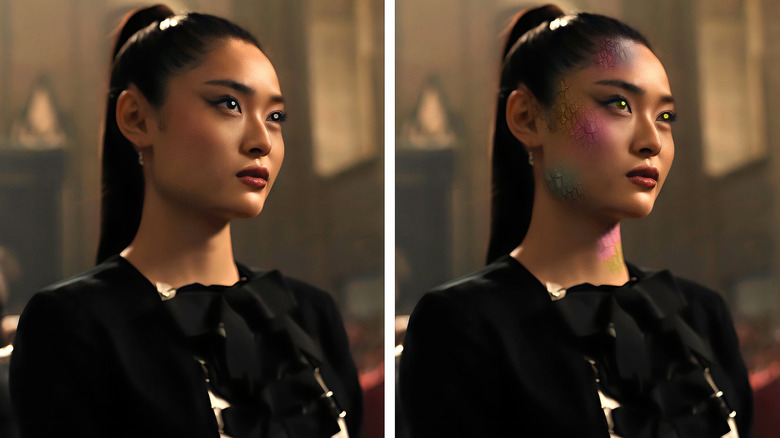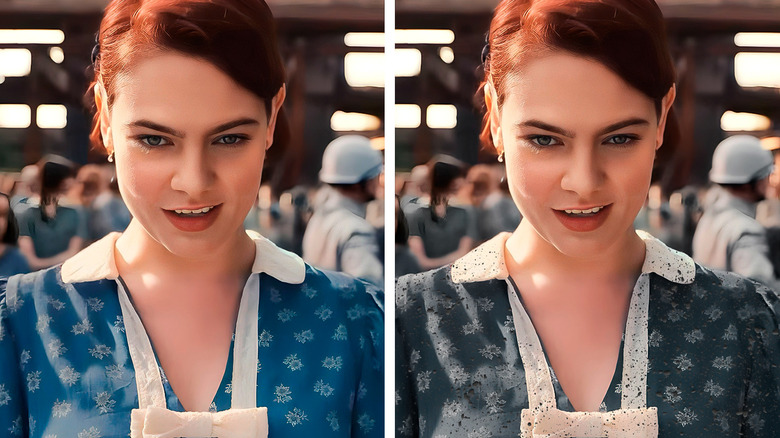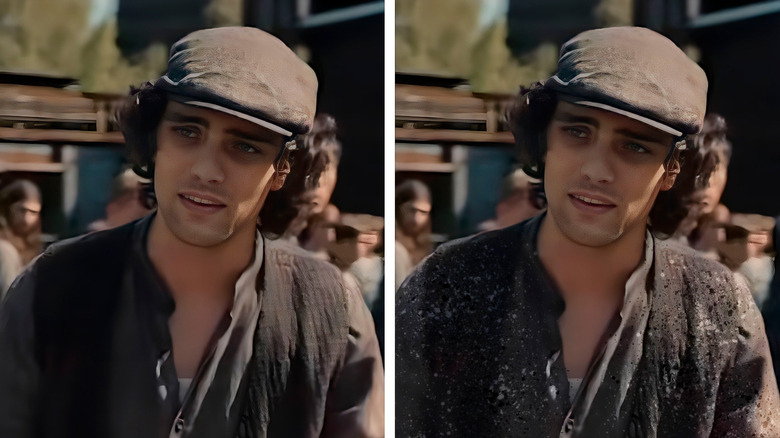How The Hunger Games: The Ballad Of Songbirds And Snakes Cast Should Really Look
"The Hunger Games: The Ballad of Songbirds & Snakes" hit bookstores in May 2020 and found its way into movie theaters in mid-November 2023. Francis Lawrence, who directed the previous three films in the franchise, picked up where he left off and his experience greatly benefited the adaptation. The crew put together compelling settings, costumes, and more to bring the world of Panem back to life on the silver screen.
Like the other films in the franchise, "The Ballad of Songbirds & Snakes" features a large cast of characters, each with their unique style, mannerisms, and appearances. The casting folks clearly put in a lot of hard work to find the best actors suited to the roles. With veterans like Viola Davis, Peter Dinklage, and Jason Schwartzman joining relative newcomers, there's more than enough talent to go around.
Of course, adapting a novel into a film often requires changes, especially regarding character depictions. The best actor for the role might not look like their character's description in the book, or changes could be made to suit the film's version of the story. But these are the leading players in "The Ballad of Songbirds & Snakes" and how they should have looked, according to the book.
Coriolanus Snow
Coriolanus Snow is the primary lead in "The Ballad of Songbirds & Snakes," and Tom Blyth portrayed him in the movie. Snow is first shown as a child played by Dexter Sol Ansell, before the narrative switches to the present where Blyth's older version takes over. Snow is one of the few characters from the original trilogy, having been played by Donald Sutherland in four films.
People describe Snow as handsome, good-looking, and gorgeous, which Blyth fits well, though there are some differences. He's a bit too well-fed. Coriolanus is destitute and often forgoes eating, which is depicted in the film, but Blyth shares something in common with the rest of the cast which differs from the book: Thankfully, he's not starving all the time.
As described in the book: "He was not as tall as he should have been. As for so many of his generation, a poor diet had likely compromised his growth. But he was athletically trim, with excellent posture, and the shirt emphasized the finer points of his physique."
Gamemakers' accuracy score: 9/10 - Blyth nailed Snow's mannerisms portrayed by his predecessor and only lost a point for high height and weight, which should be somewhat diminished.
Lucy Gray Baird
Lucy Gray Baird is the female tribute from District 12, and Rachel Zegler played her remarkably well. Lucy is charismatic, steadfast, and has an exceptional stage presence. This is due to her singing prowess and sass, which she displays the moment she's called as a tribute, singing, "You can't take my sass. You can't take my talking. You can kiss my a**!"
Zegler fits the book's description of Lucy remarkably well. Both have dark, curly hair and wear a once-colorful dress, though her mentor makes it look new in the book. Like other actors playing characters in the film, Zegler's weight is healthier than it should be — this is especially true of people from District 12.
As described in the book: "Lucy Gray Baird stood upright in a dress made of a rainbow of ruffles, now raggedy but once fancy. Her dark, curly hair was pulled up and woven with limp wildflowers. Her colorful ensemble drew the eye as to a tattered butterfly in a field of moths."
Gamemakers' accuracy score: 10/10 - Zegler was perfectly cast to play Lucy, and she even nailed the Southern accent Suzanne Collins uses when reading the character's dialogue out loud.
Sejanus Plinth
Sejanus Plinth is Snow's closest friend in the film, though their friendship in the book took time to develop. The two meet when Plinth and Snow are 8 years old, and despite Plinth coming from District 2, he appears well-fed due to his father's ammunition supply business. In the present, Plinth is a wealthy Capitol citizen played by Josh Andrés Rivera, who is 10 years older than the character he portrays.
Besides the age difference, which isn't glaringly obvious in the film due to the actor's youthful appearance, Rivera plays the character as he's written. The book's physical description is scant beyond mentioning his frame and curly brown hair, which is equally attributable to Rivera's appearance in the movie. The most important aspect of Sejanus Plinth is his pacificism which Rivera portrays exceedingly well.
As described in the book: "A shy, sensitive boy. ... with soulful brown eyes much too large for his strained face."
Gamemakers' accuracy score: 8/10 - Rivera looks much like Plinth as described in the novel but loses a couple of points due to the 10-year age difference between the two.
Dr. Volumnia Gaul
Dr. Volumnia Gaul is the mastermind and creator behind the muttations used in the Hunger Games, and she's the head gamemaker responsible for overseeing them. She's also one of the most fascinating characters in a film chock full of them. This is in no small part due to Viola Davis' brilliant performance in the movie, which features some alterations to her character's look. However, they unquestionably add credibility to Gaul's depiction as a mad scientist.
Specifically, the film's Dr. Gaul has heterochromia — she has two different colored irises. Davis requested this modification personally, believing it fit the immoral scientist's personality and penchant for dangerous lab work. The book's description is limited to her age and hair, but it also mentions a stoop. Davis didn't portray a stoop in the film; this version of Gaul stands and walks upright. In terms of aging, the makeup department made Davis look older than she is, which better approximates the character's description in the book.
As described in the book: "A small, stooped old woman with frizzy gray hair."
Gamemakers' accuracy score: 8/10 - Davis' performance is top-notch, which is hardly surprising, but she loses points due to the addition of heterochromia, which worked well for the film but isn't in the novel.
Dean Casca Highbottom
Dean Casca Highbottom is one of the most influential people in the "Hunger Games" franchise, as he created the annual reaping of Panem's children. This was inadvertent, leading Highbottom to seek solace in substance abuse, preferring the painkiller morphling. He also hates Snow since his father made the Hunger Games a reality.
Peter Dinklage plays Highbottom in the film, and his performance is an exceptional depiction of the character as he's written. Physically, he looks like the book's description with two minor differences: Highbottom wears glasses in the book, but not in the film; and Dinklage's Highbottom doesn't have sagging skin as described in the book, but he nails his depressed and tired look.
As described in the book: "He presented himself to the students with all the verve of a sleepwalker, dreamy eyes, and, as usual, doped up on morphling. His once-fine physique was shrunken and draped with sagging skin."
Gamemakers' accuracy score: 7/10 - Dinklage's Highbottom and the one in the book differ due to a lack of saggy skin and glasses, though he often forgets them in the book. Maybe that's also true in the film?
Tigris
Tigris first appears, played by Rosa Gotzler, in a flashback alongside her cousin Coriolanus Snow. In the present, Hunter Schafer played the character who, like her cousin, is one of the few to appear in prior "Hunger Games" films. In "Mockingjay – Part 2," Tigris is played by Eugenie Bondurant, and she looks like a feline, but in "The Ballad of Songbirds & Snakes," she's yet to make this transformation.
Tigris isn't described as beautiful in the book — far from it. Instead, she's quite the opposite, which doesn't align with Schafer's depiction. In the film, Tigris is an attractive young woman with long blonde hair. She wears makeup and has an appealing appearance, so there's no hint of who she is in the novel.
As described in the book: "With her long, pointed nose and skinny body, Tigris was no great beauty, but she had a sweetness, a vulnerability that invited abuse."
Gamemakers' accuracy score: 5/10 - Tigris isn't depicted in the film as the book describes her. That's not to say Schafer didn't perform well — she did, but she doesn't have a long, pointed nose and isn't unattractive. She's skinny, but not in the way described in the novel.
Grandma'am
Grandma'am is the name given to Coriolanus' grandmother when he's a child. Grandma'am lives a life of wealth and opulence until the war comes along. By the time the First Rebellion ends, she's the only family left to Snow. In the present, Grandma'am puts on her airs as best she can in public despite her financial destitution.
Veteran sci-fi actor Fionnula Flanagan played Grandma'am in the film, and her portrayal is spot-on. Much of Grandma'am's description in the book centers around her clothing, and the costume department paid attention. In addition to her physical appearance, which is limited to describing her as elderly with white hair and hand tremors, Flanagan played her as she's written.
As described in the book: "She wore a long, black, flowing tunic, the kind so popular before the war and so outdated as to be laughable now, and a pair of embroidered slippers with curled toes that had once been part of a costume. Strands of her thin, white hair poked from the bottom of a rusty velvet turban."
Gamemakers' accuracy score: 10/10 - Nothing separates Flanagan's performance and Grandma'am in the novel.
Lucretius Flickerman
Lucretius "Lucky" Flickerman is a weathercaster who interviews the tributes for the 10th Hunger Games and functions as the games' emcee throughout the broadcast. Lucky is charismatic and has a penchant for magic tricks, which he performs whenever he introduces himself to the audience. Jason Schwartzman played him in the film and seemingly channeled Stanley Tucci's Caesar Flickerman (Lucky's son) from the previous movies.
Schwartzman played Flickerman as he's written in the book, which describes him as "clownish." Still, there are a couple of differences between the two. In the novel, Flickerman dusts his hair with a coppery powder, which isn't apparent in the film. Also, there's no mention of a mustache, which Schwartzman prominently displayed with curled ends. On top of that, his parrot, Jubilee, is absent from the film.
As described in the book: "Lucky was dressed in a high-collared blue suit with rhinestone accents, his gelled hair was dusted in coppery powder, and his mood could only be described as merry."
Gamemakers' accuracy score: 7/10 - The differences between Schwartzman's portrayal and the book's description are minimal. While Collins doesn't mention a mustache in the book, it doesn't say that he doesn't have one — but the absence of Jubilee is a glaring omission.
Jessup Diggs
Jessup Diggs is the male tribute from District 12. At first, he and Lucy stay together. Of course, the Hunger Games is a free-for-all, and their contest must come down to a single victor. Despite this, Lucy attempts to help him early in the games. Nick Benson played Jessup in the film, and he looks like the character described in the book, save for the nature of his hair.
In the book, Jessup has "a fringe of black hair," which doesn't describe Benson's look in the film, which has him sporting a short afro. Jessup works in the mines, and despite the general scarcity of good food, he builds up an impressive physique. This does apply to Benson, who has an impressive physique and stands 6' 1" tall, according to his IMDb page.
As described in the book: "A boy with a fringe of black hair plastered down on his prominent forehead. As District 12 tributes went, he was a fine specimen, bigger than average and strong-looking."
Gamemakers' accuracy score: 8/10 - Benson's portrayal of Jessup is close to his character's description in the book, but he loses points for his different hairstyle.
Lamina
The film doesn't show much of Lamina until the games commence, and the tribute from District 7 isn't incapable of handling an axe. In the book, she lands the first kill in the Arena, but in the movie, Lamina hides before killing Marcus and cutting him down from a beam, giving her the high ground over the remaining tributes.
The novel describes Lamina as capable, and while not much is said about her appearance beyond her halo of blonde hair, it's clear she's a fighter. Despite her circumstances, she understands what's at stake and handles it as best she can. Irene Boehm plays her in the film and bears little resemblance to the character's description in the book.
As described in the book: "The summer breeze ruffled her blonde halo of hair, and she squinted against the brightness of the sun. She wore a dress that looked to be fashioned from a flour sack and belted with a piece of rope, and insect bites dotted her bare feet and legs. Her eyes, puffy and exhausted, were reddened but tearless. In fact, she seemed strangely calm for her circumstances."
Gamemakers' accuracy score: 6/10 - Lamina should have a halo of blonde hair, not shoulder-length brown curls. Boehm's eyes are correct, but her clothing isn't as drab as described.
Commander Hoff
Commander Hoff is the leader of the Peacekeeper base in District 12, and he rules relentlessly over his people. To keep the peace, he often hangs people at the so-called Hanging Tree and does so in front of the gathered crowd of the district's denizens. Hoff is a gruff, humorless man concerned only with the strict application and enforcement of the law.
Burn Gorman played Hoff in the film, and he didn't have much to go off of from the novel. Outside of calling him old and ornery, the book isn't full of descriptive text regarding Hoff. Gorman is hardly elderly and was 49 when the film was released. He's not depicted as an older man in the movie, either, having no gray hair or wrinkles you might expect from a senior-level base commander.
As described in the book: "An old goat."
Gamemakers' accuracy score: 6/10 - Commander Hoff's appearance should align with someone in their 60s rather than a fellow in his 40s devoid of the typical markings of age. For this reason, he loses some points, which could have been avoided with a bit of makeup.
Clemensia Dovecote
Clemensia Dovecote is a friend of Snow, and the two receive a homework assignment requiring an essay on ways to improve the Hunger Games. Clemensia is incapable of helping after witnessing the death of their classmate at the hands of her tribute, so Snow writes the essay. Unfortunately for Clemensia, she takes partial credit, leading Dr. Gaul to punish her severely. In the book, Snow describes Clemensia as the most attractive girl in his year when referencing Lucy's beauty, placing his tribute just behind Clemensia.
It's difficult to say Ashley Liao isn't a beautiful woman, so she fits that description. The most significant difference relates to Clemensia's disappearance in the movie. In the book, the snake bite disfigures her, causing peeling skin and discolored eyes. She also has a twitch throughout her body, and the bitten area develops a colorful scaled appearance similar to the beast that bit her.
As described in the book: "Raven hair."
Gamemakers' accuracy score: 5/10 - Clemensia is attractive in the book and movie, but after she's bitten, she disappears. She should have returned with extensive injuries and disfigurements but is instead dropped by the film's narrative.
Mayfair Lipp
Mayfair Lipp doesn't have much screen-time in the film, but she's nonetheless important in Lucy's life. She's introduced when Lucy drops a live snake into her blouse as Mayfair grins at hearing Lucy's name called as tribute. Mayfair is the mayor's daughter and wears nicer clothes than most of the residents of District 12, though her clothing is dusted with soot, as is everyone's in the district. She has a manner that suggests she thinks she's better than the other residents of District 12.
Isobel Jesper Jones played Mayfair in the film and perfected her smirking arrogant disposition. She's not on screen for long but gets across a mocking tone that Jones also perfected in her performance. Beyond that, the film's depiction is close to the novel's description of the character, though she could have been a touch dirtier with sooty clothing and a smudge or two on her person.
As described in the book: "The smirking thing was spiteful, and her father a brute who would flatten a girl he'd just sentenced to death."
Gamemakers' accuracy score: 9/10 - Soot truly is a problem in District 12, and Mayfair is a touch too clean in the film.
Billy Taupe Clade
Shortly before the film's events unfold, Billy Taupe Clade breaks Lucy's heart. He leaves her for Mayfair, which explains her smug attitude and Billy's apologetic pleas after Lucy is named tribute. He's later revealed to be at the center of the growing rebellion in District 12 and dies at the end of the movie.
Dakota Shapiro played Billy, and he looks a lot like the character described in the book. He has dark hair and carries an accordion. This is a spot-on depiction of the character, though he doesn't wear a sleeveless shirt; instead, Billy partially rolls his sleeves up in the film.
As described in the book: "A dark-haired young man around his age, dressed in a sleeveless shirt and pants ripped off at the knees. ... His face gleamed with sweat, and his movements suggested he'd exceeded his white liquor limit some time ago. Over one shoulder hung a boxy instrument with part of a piano keyboard along one side."
Gamemakers' accuracy score: 9/10 - Shapiro looks like Billy and only needs to rip off his sleeves and dirty his clothes to get it exactly right.
